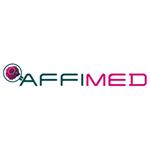- An exposure-outcome analysis in 72 patients with refractory non-small cell lung cancer (NSCLC) who received AFM24 at 480 mg weekly demonstrates that higher drug exposure (above median) leads to improved objective response rate (33.3% vs 5.6%) and longer progression free survival (PFS) (7.3 mo. vs 2.9 mo.) without a negative impact on safety
- These findings will be incorporated in future AFM24 trials to further improve efficacy outcomes of patients treated with AFM24
MANNHEIM, Germany, April 29, 2025 (GLOBE NEWSWIRE) -- Affimed N.V. (Nasdaq: AFMD), a clinical-stage immuno-oncology company committed to giving patients back their innate ability to fight cancer, today presented findings on an exposure-outcome analysis of its innate cell engager (ICE®) AFM24, in patients with advanced or metastatic non-small cell lung cancer (NSCLC) in a poster session at the 2025 Annual Meeting of the American Association for Cancer Research (AACR).
The analysis is based on post-hoc exposure-response data from 72 NSCLC patients treated with 480 mg of AFM24 monotherapy or a combination of AFM24 with atezolizumab. For all patients, trough levels over time were used to calculate the patient’s mean exposure to AFM24. Patients were then split into high and low AFM24 exposure groups for the analysis using the respective median as a cut-off.
Key Findings from the Exposure-Response Analysis
- Objective Response Rate (ORR): 33.3% in the high-exposure group vs. 5.6% in the low-exposure group (p=0.0059)
- Disease Control Rate (DCR): 83.3% vs. 58.3% (p=0.0367)
- Median Progression-Free Survival (mPFS): 7.33 vs. 2.86 months
- Overall Survival (OS): Not yet mature in the high-exposure group vs. 13 months in the low-exposure group
A quartile analysis further confirmed the exposure-efficacy relationship, showing a stepwise increase in ORR from 0% in the lowest quartile to 50% in the highest. Subgroup analysis of 55 patients treated with AFM24 plus atezolizumab showed consistent results: 37.04% ORR in the high-exposure group vs. 7.14% in the low group. Importantly, higher exposure was not associated with an increased rate of more serious or severe adverse events.
“Advanced NSCLC is a devastating disease and remains an area of high unmet need,” said Andreas Harstrick, MD, Chief Medical Officer of Affimed. “These findings strengthen our clinical rationale for dose optimization and highlight the potential of AFM24 – particularly in combination with atezolizumab – as a novel, chemotherapy-free, immunotherapy-based treatment approach. Importantly, the data suggest that achieving higher drug exposure early in treatment may prevent rapid disease progression.”
Further Development
Pharmacokinetic (PK) modeling indicates that a 720 mg weekly dose of AFM24—previously established as safe—achieves target exposure levels by the second week of treatment that correspond to the high exposure group in the post-hoc analysis. Based on these findings, Affimed will include the 720 mg dose moving forward to optimize clinical benefit and reduce early progression risk.
“These data provide compelling evidence that higher exposure may translate to better outcomes in patients with advanced NSCLC,” Dr. Harstrick added. “With dose optimization in hand, we are positioned to advance AFM24 in its potential to deliver durable benefit in a difficult-to-treat patient population.”
Conclusions
The data show a strong correlation between exposure and clinical outcome with a significantly increased risk for early tumor progression in the low exposure group. PK modeling suggests that a dose of 720 mg AFM24 weekly will result in exposure levels exceeding the cutoff for the high exposure group as early as week two. The 720 mg dose, which has already been established as safe in the phase 1 trial, will be used in future AFM24 studies.
More details about the programs for the AACR Annual Meeting 2025 are available online at AACR Annual Meeting 2025 | Meetings | AACR.
About AFM24
AFM24 is a tetravalent, bispecific ICE® that activates the innate immune system by binding to CD16A on innate immune cells and epidermal growth factor receptors (EGFR), a protein widely expressed on solid tumors, to kill cancer cells. Generated by Affimed’s fit-for-purpose ROCK® platform, AFM24 represents a distinctive mechanism of action that uses EGFR as a docking site to engage innate immune cells for tumor cell killing through antibody-dependent cellular cytotoxicity and antibody-dependent cellular phagocytosis.
About Affimed N.V.
Affimed (Nasdaq: AFMD) is a clinical-stage immuno-oncology company committed to giving patients back their innate ability to fight cancer by actualizing the untapped potential of the innate immune system. The Company’s innate cell engagers (ICE®) enable a tumor-targeted approach to recognize and kill a range of hematologic and solid tumors. ICE® are generated on the Company’s proprietary ROCK® platform which predictably generates customized molecules that leverage the power of innate immune cells to destroy tumor cells. A number of ICE® molecules are in clinical development, being studied as mono- or combination therapy. Headquartered in Mannheim, Germany, Affimed is led by an experienced team of biotechnology and pharmaceutical leaders united by the bold vision to stop cancer from ever derailing patients’ lives. For more about the Company’s people, pipeline and partners, please visit: www.affimed.com.
Investor Relations Contact
Alexander Fudukidis
Director, Investor Relations
E-Mail: a.fudukidis@affimed.com
Tel.: +1 (917) 436-8102
Media Contact
Mary Beth Sandin
Vice President, Marketing and Communications
E-Mail: m.sandin@affimed.com


